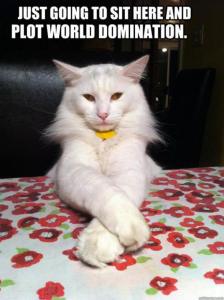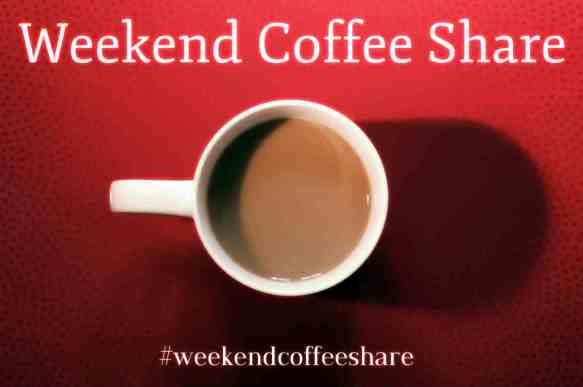If we were having coffee, I’d tell you I’m glad to be chatting with you again. I don’t know what all I’ve missed and I don’t have a lot to say about how things are going in my life because I said it all earlier this week. So I’ll just get weird today.
Diana and I have used a lot of metaphors for social media interaction over the last couple of years. I framed my kickoff posts as a startup announcement and played it for laughs. I often think of Sourcerer as a ship — that’s why all the pirate humor. When we talk about building a social network while we figure out how to get big web traffic and make things go viral, it’s a plan for world domination.
These metaphors are important, because they allow us to communicate serious ideas in non-serious ways. They turn what could just seem like a big bunch of work into a sort of game that anyone can join in. They help us stay (somewhat) organized without an actual organization.
Since I’ve got a background in political science and I’m also a fantasy geek, I tend to think of social media networks most often as territorial units. In one sense, a social media account is just a communication tool. But they often feel like places. Here’s how I conceptualize my three favorite social media networks.
Facebook is a huge dystopian metropolis ruled from above by a remote, arbitrary government. Personal timelines are domiciles — glass-fronted tenements that lots of people can see into but few people actually look. Because when everyone’s living under glass, the transparency becomes part of the background. Groups, depending on how they are constructed, are like neighborhoods, clubs, or in some cases, venues for public events.
Standing on a streetcorner and yelling at everyone doesn’t get you much on Facebook, because every streetcorner has dozens of people standing on it and screaming. The communication on Facebook that matters happens in out-of-the-way places. Foggy alleys, dark corners, closed rooms.
Twitter is almost entirely exterior. It’s like a massive arena or a noisy commons. It’s also governed from above, but the powers-that-be on Twitter either rule with a lighter touch, or are a lot better at hiding their manipulation. A Twitter account is more a persona to be worn than a space to be inhabited.

Image via Suzie81’s Blog, 2014.
There are no streetcorners on Twitter, and being noisy there will get you a lot more if you do it right. But there’s a catch. Because of the character limit and the way tagging works on Twitter, the more people you try to communicate with in a single tweet, the less you can say. This is one of the things I like most about Twitter.
Blogs are all sorts of spaces. The potential for diversity in the construction of blog space is limited only by the imaginations of the people building them. A blog can be a kingdom, a city, a commune, a salon, a meeting hall . . . The possibilities are endless.
And blogs have borders, oh yes they do. Part Time Monster, Sourcerer, and this blog are contiguous territories. Well, this one is probably an island in some small body of water bounded on all sides by the other two. There are shared borders with Comparative Geeks, Infinite Free Time, Things Matter, and several other blogs there somewhere. And all those other blogs have other neighbors. Given enough time, I could put several dozen blogs on a fantasy map, and it might be pretty cool to look at.
During our first year of blogging, I thought of Part Time Monster as the crown territory of a larger unit. Not an empire — a confederation, perhaps. Sourcerer was the one and only duchy. My personal blog has never been anything more than a private estate, and that’s probably all it will ever be. Sourcerer has since emerged as an independent state, but what sort of unit it is, I can’t say. It doesn’t feel like a kingdom, but it’s more than an estate.
And every blog can be conceputalized this way — in terms of neighbors, friends, allies, visitors, antagonists. It’s an interesting metaphor, and it only gets more interesting as you push it logically toward absurdity. What this has to do with anything, I don’t know. I just felt like sharing a little geekery with you today, and I am interested to see what, if anything, you think about my metaphors.
It’s good to be back to the coffee share. Don’t forget to add your coffee post to the linkup at Part Time Monster and share it with #WeekendCoffeeShare on Twitter. And if you’ve not noticed yet, the Monster has a new look. Do take a minute to poke around and let Diana know what you think of the redesign and the new logo.
Have a great weekend!



One of the best descriptions of the social media platforms I’ve read! Glad to have your voice again on the weekend.
LikeLiked by 1 person
I’m glad you liked it. Hopefully, I am back here, at least for the coffee posts.
LikeLiked by 1 person
I too loved the descriptions, Dee. Great comment and awesome post, Gene’O!
LikeLiked by 1 person
Thanks very much! I’ve been wanting to do this post for awhile.
LikeLike
It may be the zany way I look at life in general, but I see Sourcerer as a Metropolis with portals to other regions as a featured feature. 🙂
LikeLiked by 1 person
Ha, yes. Very good. There is a bit of Sigil in its design. If you don’t know D&D, Sigil: https://en.wikipedia.org/wiki/Sigil_(Dungeons_%26_Dragons)
LikeLike
I think you hit the target right on with those description. It’s a good way to think of those outlets and a good way to think of what to post on each platform. Hope to see you back here more often now that you are settling in.
LikeLiked by 1 person
Yeah. I seem to be back. thanks 🙂
LikeLike
Lol! 🙂
LikeLiked by 1 person
Well this is a fun bit of coffee chatter. I’m looking forward to when you’re back chattering more again. Keep your head up. 🙂
Oh yeah, and thanks for mentioning the changes at the Monster. 😀
LikeLiked by 2 people
You’re welcome!
LikeLiked by 1 person
I totally wanna see us all on a fantasy map. 😀
LikeLike
Also, because I was overexcited about cartography and commented prematurely: I think of TM as a satellite. It sends transmissions, and gets them back. We’re floating in little cubicles by ourselves sending messages. (This imagery is heavily influenced by a classic sci-fi novel, but I don’t remember which one, just that there was a guy orbiting the Earth by himself sending out radio transmissions to the planet, music and commentary and stuff, that bit made much more of an impression than the rest…)
LikeLiked by 1 person
That is a lovely analogy, and I think I remember seeing or reading some version of that. I’m thinking about the fantasy map. I could probably create one — the trick would be getting the borders right and not leaving anyone out.
LikeLiked by 1 person
Maybe I should just start with a map that has four or five blogs, Facebook and Twitter represented, along with a few cleverly-named bodies of water and mountain ranges, and then post the beta version here and ask who wants to be included.
LikeLike
Yes, do it!
Also, did some Googling and pretty sure the book was Dr. Bloodmoney by Philip K. Dick. https://en.wikipedia.org/wiki/Dr._Bloodmoney,_or_How_We_Got_Along_After_the_Bomb
LikeLiked by 1 person
That figures. Not surpising at all. I’m thinking there’s some version of it in an old Outer Limits, or somesuch.
LikeLiked by 1 person
Pingback: Those awesome posts | Taylor Grace
I FINALLY got the chance to read this and really really like what you have to say in here. Especially the way of imagining the blogs. Maybe it’s the map-making I’m supposed to be doing for my novel (and the governance-structure-figuring… ugh, not my strength) but I really kind of want to place the blogs in a fantasy map and am now trying to imagine what kind of land my own blog would be in the greater scheme of things. Interesting way to reflect on things and, I think, a good way to help frame an understanding of purpose.
LikeLike
yay! Thanks. I’m thinking of finding just the right cloud, or stain, and taking the shape as the outline of a continent, and getting this done.
Relative sizes and such will be strange. It’s a thing that will take many revisions. But a lot of blogs on a Fantasy map, with Facebook and Twitter and the larger Internet represented, can be done. You, Hannah, and David are pretty much the support for this, but y’all are enough. It could be the ultimate blog directory, if you think about it.
LikeLiked by 1 person
Not only the ultimate blog directory but the ultimate AWESOME blog directory. Also could be interesting to start into conversation about how people would categorize their blogs in those terms — how you see your own blog might not match how others understand it, some interesting dialogue could be had there!
LikeLiked by 1 person
Yeah. I thought about that. The thing that is holding me back is that i would have to figure out relative territorial sizes. I woudn’t want to piss another blogger off over map representation.
LikeLike
Collaborative effort with “assume best intentions” caveat? Both small and large territories are important and useful.
LikeLiked by 1 person
yeah. The size is not important to me, but might be important to others. Blogstuff is weird. I would not want to put a city-state on the map and discover that the blogger in question thinks they’re ruling a country the size of Russia. The map is just a navigation tool, but everyone will not see it that way.
LikeLiked by 1 person